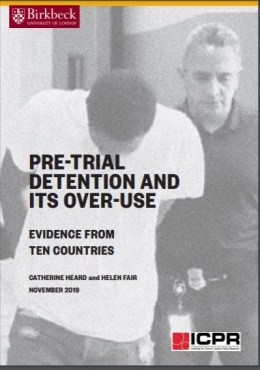Read this page in French, Portuguese, Spanish
The mi suse of pre-trial imprisonment – that is, detention of individuals prior to conviction or definitive sentencing – is a major, but preventable, cause of prison overcrowding; and a severe infringement of fundamental rights. Since 2000, pre-trial prison populations have grown substantially across much of the world. This is despite increased availability of cheaper, less restrictive measures like electronic monitoring.
suse of pre-trial imprisonment – that is, detention of individuals prior to conviction or definitive sentencing – is a major, but preventable, cause of prison overcrowding; and a severe infringement of fundamental rights. Since 2000, pre-trial prison populations have grown substantially across much of the world. This is despite increased availability of cheaper, less restrictive measures like electronic monitoring.
In many countries, there is a gulf between law and practice relating to the use of pre-trial imprisonment. Although legal systems (in line with international standards) refer to pre-trial detention as an ‘exceptional measure’ it is, in practice, often the norm. The problem is rarely the law itself, but wider socio-economic and systemic factors that influence its (mis)application.
Our in-depth research – including interviews with over seventy experienced criminal lawyers – has helped explain why this ‘measure of last resort’ is so routinely over-used. Our recommendations for reform draw on the many insights from this research.
Understanding over-use of pre-trial imprisonment
-
Socio-economic disadvantage. People from backgrounds of disadvantage are more likely to be arrested, often don’t have money to pay bail, are less likely to have good legal representation, and – for these reasons – are more likely to be detained pre-trial.
-
Criminal justice systems. Aspects of the wider criminal justice ‘machinery’ are also part of the picture: under-resourced police, prosecution and court services and infrastructure leading to huge backlogs in the investigation and prosecution of cases; inadequate legal aid; too few alternatives to custody. All these factors lead to misuse and prolongation of pre-trial imprisonment.
-
Judicial culture and practice. Judges are often too ready to make unsupported assumptions about risk; too quick to dismiss defence arguments about weak evidence or ways to mitigate risk without detaining a suspect; overly influenced by fear of media (and social media) criticism; and disinclined to give concrete, evidence-based reasons for decisions to remand in custody.
Conditions in pre-trial detention
In many countries, people in pre-trial detention are held in overcrowded, cramped and insanitary conditions, at risk of mistreatment and violence. The conditions are often worse than for sentenced prisoners. Remand prisoners usually have no access to work, education or rehabilitation.
Defendants in custody may face greater pressures to confess or accept plea deals. Being in prison makes it harder to prepare a defence, consult lawyers or review prosecution evidence. All these factors increase the risk of miscarriages of justice.
Read the report and recommendations.
Expert insights
- Kenya: finding Kafka in the criminal justice system
- India: remote hearings and the rights of accused persons
- Rehumanising pre-trial justice
- Europe: the long road to human dignity
- Europe: towards a binding legal framework for places of detention
- Will remote hearings and digital justice become the norm for pre-trial decisions in Europe? (Short film)
- Prison overcrowding in Latin America – is it caused by over-use of pre-trial detention? (Short film)